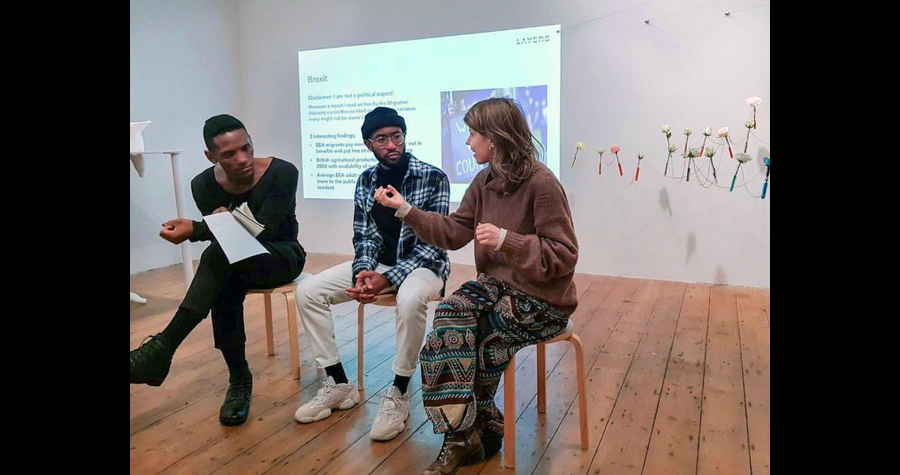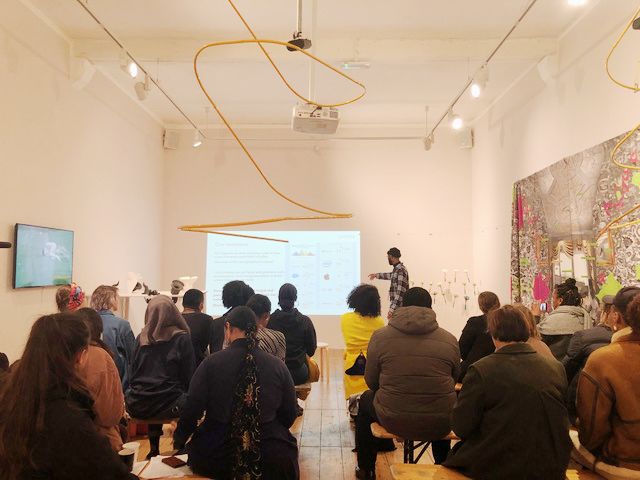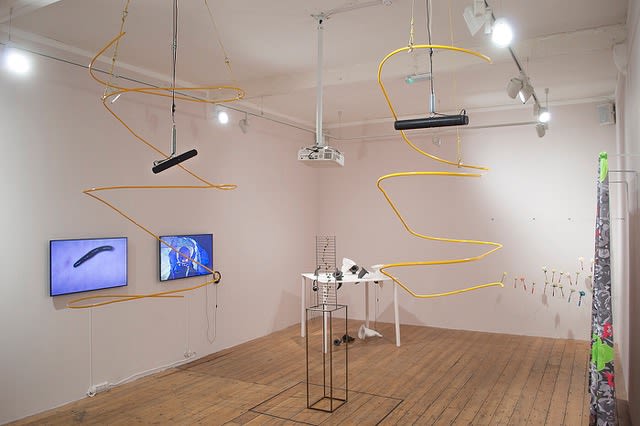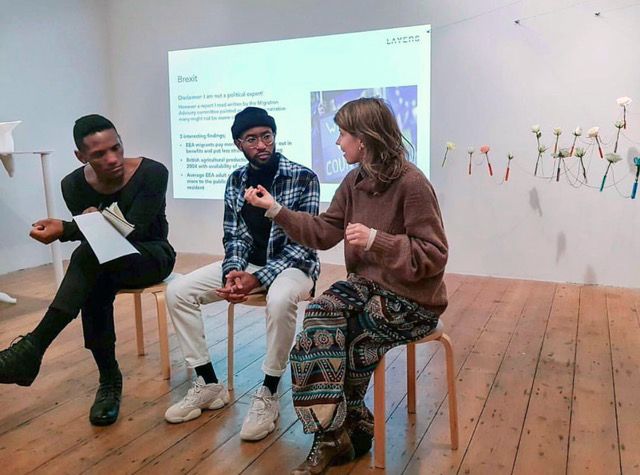The Socio-Parasitology Manifesto Exhibition: Symposium Review
by Rayvenn Shaleigha D’Clark (alumni, MA Fine Art, Chelsea)
MIGRANTS ARE POSITIVE PARASITES (SOLD-OUT Talk, Extended Symposium and Q&A ) was the third event in the public programme for the ongoing Socio-Parasitology Manifesto Exhibition, currently taking place at Nunnery Gallery. Part of the multi-dimensional format of the show, which includes an intimate Early Morning Crit, a series of Drop-In sessions and a highly anticipated Curator’s Talk , the gallery space opened its doors early on Saturday morning to some very special guest speakers.
The keynote speaker was Artist & Biologist, Aura Raulo ( @putublue ) who opened up the debate from the biological perspective of How Parasite Transmission Can Make Us More Healthy , in her presentation ‘Extended Self: Biological Identity Flows in the Networks of Touch’.
A brilliantly entertaining presentation which explored some of the similar themes emerging within her PhD, this was an illuminating start to the days proceedings further developing the ethnographic context of the ‘ social body ’ and the positive impact of parasitic interactions within new hosting environments. Continuing throughout her 45 minute presentation the discussion surrounding bias discourse related to immigrant behaviour - reframed as microbiota, which are microorganisms of a particular site, habitat, or geological period - providing several examples that not only demonstrate how biological parasites - thus migrants - are beneficial to Earth, but showcase why simultaneous and repeated (ecological) interactions with bacteria positively contribute to biodiversity.
For instance, let’s use the example Gut Worms to illustrate Aura’s hypothesis ; whilst parasitic - the worm biologically identified as a disease-causing organism, thus becomes the embodiment of a parasite animal - medically speaking, they actually help to ward off more infectious diseases within the host. Thus Raulo notes the causal impact that these interruptions do have within an ecosystem, especially when they are introduced to a new and unfamiliar environment, her emphasis here turns towards of the necessity of physical touch as an important action in fostering and maintaining relationships between different social and cultural communities. Here Raulo coins the idea of health being transmittable - spread via physical contact between bodies - in very much the same way germs migrate and spread within any given environment, positively reframing the symbiotic nature of
parasite-host relationships within her discussion which was simultaneously educational, relatable and digestible.
Images from the event
The second presentation of the evening by Tunde Abdulazeez (Creative Director of Arts/Culture media platform LAYERS ) ironically titled - Yam versus Sweet Potato: What’s the Difference? - centered the experiences of Abdulazeez who moved to England when he was a young child. Unpacking many of his personal experiences in his youth as key to unlocking creative autonomy for people of colour, it culminated in a pertinent and progressive conversation which explored the socially-casual nature of existence between all people(s) in today's social communities. Specifically, Abdulazee cemented his performance by looking at the importance that perception carries and its impact upon creative opportunities for people of colour, offering great insights into the danger posed within a system centred around building and maintaining walls to separate different groups of people.
The final Q&A segment of the event united both guest speakers, culminating in a moderated dialog by Othello De Souza Hartley (Award Winning Visual-Artist & Creative Consultant). Continuing the discussion around themes and experiences related to Brexit, Migration, Media Broadcasting Language, in which the Human Body as ‘subject’ became centred within the group discussion, this was a ingenious uniting of personal perspectives, expanding into a critical discussion of the distinctly interpersonal, social-science-led narrative as a means of interrogating our own usage and value in the current political crisis by all attendees of the event.
Perhaps one of the most salient deliberations to emerge from the symposium was the idea of Statistics verses Mysticism . That within a political climate filled with complex and conflicting discourses its foundation remains firmly rooted within notions of singularity ; this very particular kind of ideological juxtapositioning that essentially pits two entirely opposing - often warring ideals - against one another; white versus black or good versus bad, where the migrant as parasite is always the latter. The way in which the conversation maintained a perceptibly human dimension - was truly inspiring as all participants became directly implicated in identifying several forms of agency - in the need to create positive social change and reframe the negative connotations related to migrants within popular culture.
Stay tuned for video footage of the Symposium which will be published via Shades of Noir very soon.
-----
Public Programme
Event link
Event Facebook page
-----
THE SOCIO-PARASITOLOGY MANIFESTO EXHIBITION is based on a Manifesto written by Sabrina Mumtaz Hasan and focuses on the positive aspects of migration, through the lens of the parasite. During this pivotal period of political change, The Socio-Parasitology Manifesto entails an exhibition of artworks in response to Hasan’s working model Socio-Parasitology. The ambition of this exhibition is to put into discussion the positive parasite-host relationship, as a means of exercising new methods aimed at finding social change by editing the current pejorative perspective of
human bodies behaving parasitic towards each other and new hosting environments. The exhibition aspires to further develop the ethnographic context of the social body inclusive of the immigrant – expanding it in an interpersonal science-led narrative as a means of interrogating our existence, usage and value in the current political crisis. The exhibition is in lead up to Brexit and is a polemic act of resistance for positive change in the UK in supporting minority groups, immigrants and the communities we live in.




